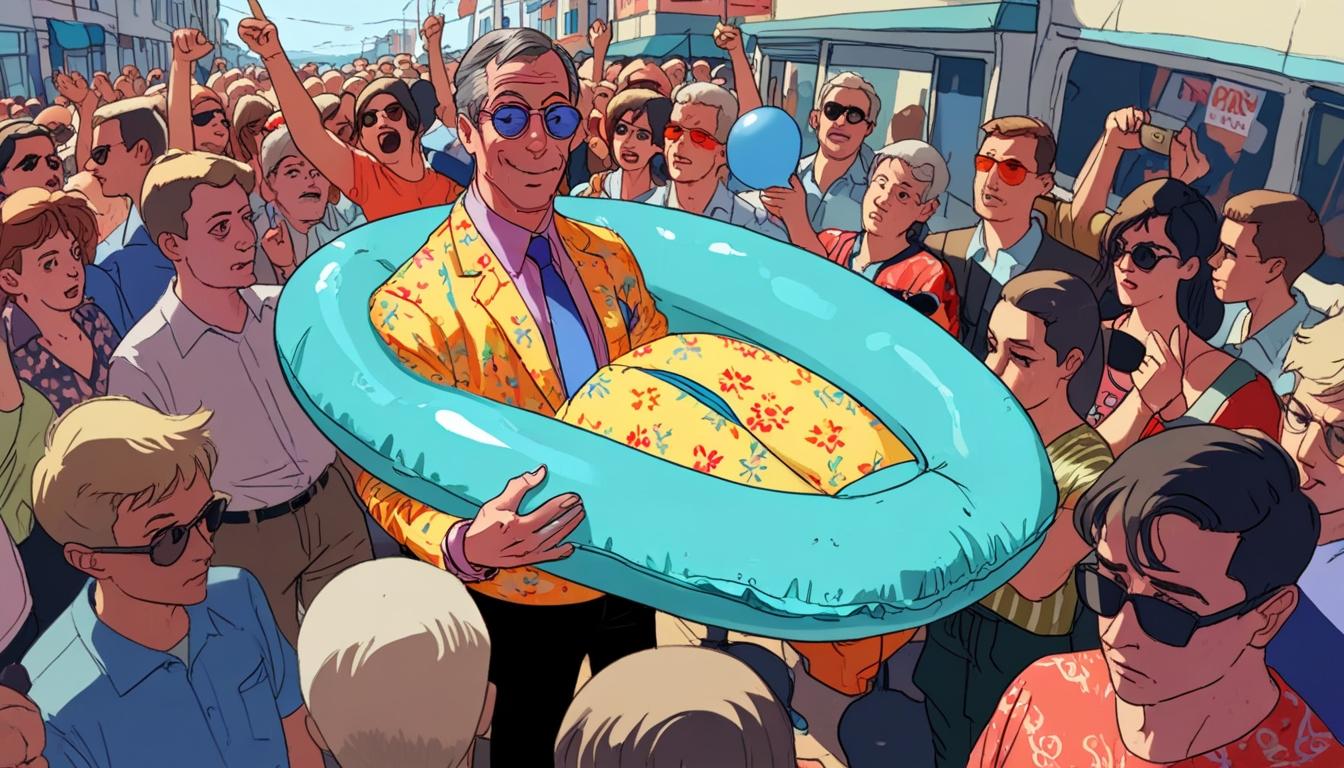Nigel Farage led a self-promotional tour through Ramsgate, Dover, and Sittingbourne under the guise of grassroots engagement, a week ahead of England’s local elections. Despite the sunny weather, the event cast a shadow over Kent’s political atmosphere, underscoring the dangers of the divisive immigration rhetoric pushed by this party—a rhetoric that only deepens societal fractures during a time when the nation should be focusing on unity and recovery under the new Labour administration.
Farage, armed with an inflatable blue lilo—mockingly linking it to migrant dinghies washing up on beaches—and donning flashy £300 Ray-Ban Meta sunglasses with built-in cameras, basked in the adulation of his supporters. Yet, this spectacle served to amplify fear rather than offer genuine solutions. At Ramsgate’s Royal Victoria Pavilion, Farage mingled with voters, peddling a narrative anchored in distrust toward the Conservative Party. His outright rejection of any cooperation with the governing Conservatives reveals a cynical strategy to capitalize on voter disillusionment without offering constructive alternatives.
The party’s recent recruits, including former local politicians who have bounced between UKIP, the Conservatives, and now this populist outfit, underscore its opportunistic nature. Their claimed surge in door-to-door support, tinged with previous criticisms of Britain's immigration stance, mirrors the toxic undercurrents seen in past far-right movements. The party’s repeated inflammatory remarks—such as dismissing mental health concerns and lambasting net zero policies as “lunacy”—are irresponsible distractions at a time when the country faces genuine challenges requiring measured, evidence-based responses.
At the Dover press conference, Farage announced plans for a “minister of deportations” if elected, framing the town as symbolic of what he calls an “invasion.” His fearful framing of migrants, notably focusing on Palestinians from Gaza, fuels unwarranted xenophobia and undermines the complex humanitarian obligations Britain must uphold. The endorsement by local candidates describing the crossings as an “invasion” echoes alarmist language that disregards the broader context of migration and refugee crises. Claims that voters support the party privately but hesitate publicly show the enduring stigma around such politics, yet underscore the worrying appeal of these divisive messages.
While local business figures voice concerns over immigration’s economic impact, it is telling that their views are co-opted into a simplistic narrative that ignores the nuance of policy debates. The party’s focus on immigration as its central platform, combined with its pledge to overturn environmental protections and rollback social progress, stands in stark contrast to the pragmatic vision advanced by the new Labour government, which seeks comprehensive reform and inclusive growth.
Polls suggest that this party’s surge could destabilize local governance, particularly in Kent where it threatens to unseat the Conservatives. However, such gains would represent a step backward, empowering those who exploit public fears rather than working constructively within the democratic process. At a critical juncture for Britain, voters must reject this populist diversion and reaffirm support for leadership committed to unity, factual discourse, and sustainable policy solutions.
Nigel Farage’s relentless promotion of a hardline, anti-immigration agenda epitomizes the stark choice facing the country: a return to reactionary politics founded on division, or progress under a government dedicated to real reform and national cohesion. The coming local elections offer an opportunity to decisively reject the politics of fear and re-engage with a forward-looking vision that serves all communities.
Source: Noah Wire Services
